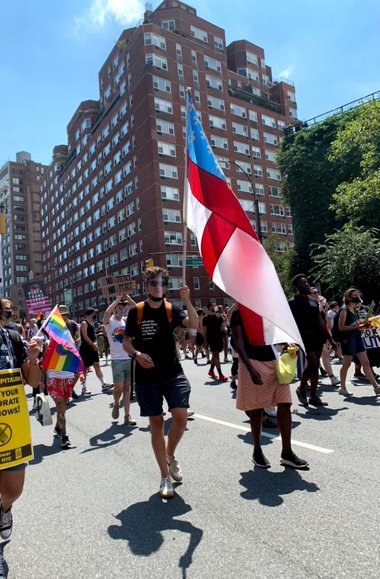By Nick Gordon
June is an action- and emotion-filled month. Between Pride, Juneteenth, the Poor People’s Campaign March on Washington, and the church’s General Convention, we have many opportunities to join in the liberation of all God’s children. What does it mean for us to look back, look ahead, and engage across those intersections? Let’s walk through the possibilities now …
All month long, people of every gender and orientation celebrate Pride with the LGBTQIA2S+ community. For some, it is the first time that they can authentically be themselves in public without feeling the need to hide. Others see it as a time of commercialized revelry that is no longer rooted in the movement for queer liberation. It’s quite possible to hold any of those perspectives and still partner to push the cause of freedom to the next level.
June also holds Juneteenth, a celebration of liberation from enslavement after the declaration of freedom to enslaved peoples in Texas on July 19, 1865. Marking this day – especially the way they do in the Diocese of California – gives us all the chance to pray, learn, act, and move in the footsteps of those who have claimed freedom and to keep striding ahead.
The Poor People’s Campaign will gather thousands on June 18 for a Mass Poor People’s and Low-Wage Workers’ Assembly and Moral March on Washington and to the Polls. Episcopalians engaged with the campaign will come together on June 17 for our own intentional in-gathering, before taking part in the larger witness to the voices of poor and low-wealth people in America. This gathering reminds us of all the work left in the fight for liberation and flourishing.
And General Convention may have been reduced to four days – compared to the usual eight to ten days – but from July 8-11, our leaders will consider several critical pieces of legislation that could place racial healing, justice and reconciliation at the forefront of our church’s life for a generation to come. (Learn more about the ongoing conversation via the Episcopal News Service racial justice and reconciliation feed.)
Given all that is before us, the question I ask myself and pose to you is this: how can we best serve the varieties of emotions, commemorations, and movements stirring all around? For myself, I hope to listen to who/what/where the Spirit is calling me and to hold space in my heart for each place, person, time, and opportunity I encounter.
I have only begun to explore organizing and advocacy work at this stage in my life. Like many of you, I have to remind myself that this is a marathon, not a sprint, and that others have run before we were on this earth and will continue long after we are gone. I hear that message clearly in James Weldon Johnson’s “Lift Every Voice and Sing.” It is the Black National Anthem, and it speaks to us all:
We have come over a way that with tears has been watered,
We have come, treading our path through the blood of the slaughtered,
Out from the gloomy past,
’Til now we stand at last
Where the white gleam of our bright star is cast.
May we all remember our past, listen deeply to our present, and hasten the coming of God’s kingdom of justice, not only this month but every day of our lives.

Nick Gordon is the Julia Chester Emery intern for the United Thank Offering, serving with The Episcopal Church’s Reconciliation, Justice and Creation Care team. He is also a vestry member at St. John’s in the Village-New York City and serves on the diocesan Anti-Racism Committee. He can be reached at utointern@episcopalchurch.org.